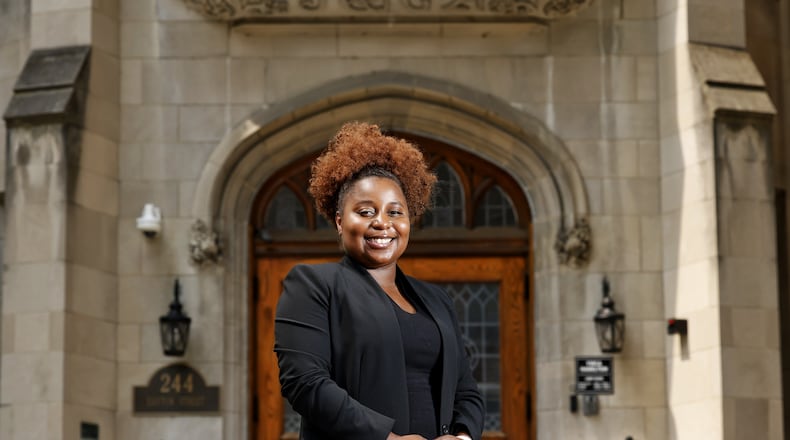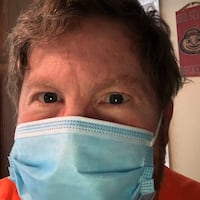Hale plans to spend the next year working to improve lives of minorities in three areas: health care; education; and community engagement. Here are some of her approaches.
Health care issues
People of color locally and nationally do not have the same health and medical advantages other Americans do, Hale noted in a recent Journal-News interview.
As one example, in Butler County, “Black infants are twice as likely to die before their first birthday than white infants,” said Tracey Bishop, the program manager for maternal and child health at the Butler County Health District.
Bishop, who is working with Hale to improve that rate, adds, “If we talk about infant mortality, we have to talk about racial disparities and health inequities.”
Black mothers also “are dying at alarming rates across the country,” Bishop said. “It’s something we’re seeing here in Ohio, and that’s something that I’m starting to look at” with local data.
There are many factors that lead to those and other health problems facing people of color, Bishop and Hale note. Those include insufficient transportation to medical appointments before and during pregnancy, nutrition, food insecurity and issues with health care.
As an overall problem with minority health care, many are reluctant to visit doctors because of distrust. They may fear “micro-aggressions” from doctors or staff, they’re reluctant to ask questions, or they don’t understand medical jargon, Hale said.
“That’s one of our priority areas,” Hale said. “How do we train doctors to just understand that implicit bias exists? We all have bias. But we have to be aware of it in order to fix it.”
Racial differences with school discipline
Nationally, people of color generally have lower educational outcomes than white counterparts, Hale said.
The top issue she wants to explore locally is, “We see that students of color have higher rates of discipline than their white counterparts, even in districts where they’re the lowest percentage of the population?” Hale said.
She said she wants to work with districts “to understand what are some policy and practices that are disproportionately being executed on women, and women of color, students of color, and figuring out, what are some ways we can assess these policies to be more just practices?”
Are those disciplinary policies providing good results, “or are you seeing the same students committing the same infraction?” What can be done about that, she asks.
“I think part of this conversation is also knowing that districts with higher rates of staff of color also have a lot more opportunity for students of color to be supported in different ways,” she said.
She’s pleased that students at Hamilton High School created created an organization called Melanated Matters, named for the pigment that creates Black and brown skin tones.
“It’s an extra-curricular group that is focused on Black and brown excellence, but it’s open to all students within Hamilton High School who are willing and want to do that work,” Hale said. “Data like discipline disparities has been something that they want to prioritize. How do we engage young people in some of the changes in their own school? So it’s a really awesome group that we’re excited to support.”
Community engagement
Hale’s third area of focus involves making sure “our communities are places that all citizens feel that they can engage and participate.”
It’s important for people to take action when improvements are needed, and she wants to give people confidence to do that, and to know how to speak before their city council or school board.
“How do we really get community members activated, especially communities of color?” she asks.
Also, by teaching girls and young women to stand up for themselves in positive ways, they can better advocate for themselves and their peers, creating better futures for themselves and less trouble with authorities, she said.
“The anchor initiative for this is going to be really increasing civic engagement through some social activism,” she said.
Starting April 4, the YWCA will launch a national Stand Against Racism Challenge.
It will be a 21-day virtual activity where people who register receive, each of those 21 days, things like 10-15-minute videos, things to read and informational graphics about different aspects of racial injustice in America.
During and after that period, people will be asked, “How do we change this reality? Does this reality exist in Hamilton, and then how do we shift it?” Hale said.
Registration starts on Martin Luther King Day and anyone can register at ywcahamilton.com. People can register using the “Get Involved” tab and then clicking on “21 Day Challenge.”
The program will give people tangible examples of how racism exists “and how racism really harms us all,” she said.
“Whether you’re part of a community of color or not, racism limits the possibilities of us as a community if we allow it to be part of our system, and if we don’t speak out against it and do the work to undo it, and to be actively anti-racist, and work against it,” Hale said.
After the challenge, people who want to dive deeper in groups or want to take action can join “affinity groups,” she said.
Faith in the next generations
Hale in November announced the creation of the Greater Hamilton Coalition against Hate, which will speak out against hateful actions and offer support to victims of them.
Hale says she has faith that younger people who see problems such as racism will work to eliminate it.
“I am consistently inspired by young people, because I think the young people truly are at a place where they want to see change, and if they don’t see it, they’re willing to create it, or advocate for it in a way that is ‘a very peaceful agitation,’ is what I like to call it,” she said.
“We can learn a lot from young people, and I think that level of resilience we’ve just seen in them, even in the past two years, and they’re still consistently working toward making some community change. It gives me hope for the future.”
The Rev. Victor Davis, who began Hamilton’s annual Martin Luther King Day march more than three decades ago and has organized each year since, was pleased to learn about the work Hale is doing, but disappointed he hadn’t learned about it sooner.
“That’s a lot,” Davis said, when told during an interview about Hale’s plans. Davis currently is pastor of Quinn Chapel AME Church in Chillicothe. “It’s a positive. Unfortunately, once again, it’s something that came about the folk in the community didn’t know about.”
“It’s a great idea, and it sounds like it can be a major benefit,” Davis said. “However, I just wonder who’s aware of it, and how it’s going to take place.”
Hale noted one problem she’s had during the COVID-19 pandemic is meeting with people in person. She reached out to Davis Friday o make a connection.
A sense of urgency
Asked last week what she would be thinking about on Martin Luther King Day, Hale said, “I think this year I will be reflecting on, 1., how far we’ve come and really reflecting on how we can engage and get everyone to understand that fighting racism is all of our job.”
She said her goal is by next MLK Day, more local organizations and people “share the role in the work of racial justice, and embrace that role, and are excited about doing their part to eliminate racism.”
It’s critical work, agrees Bishop of the health district. Referring to the higher rates of Black infant and maternal deaths, she said, “These are human lives. These are our most vulnerable citizens in Butler County. And if we’re not protecting them and taking care of them, and taking care of women, it speaks to bigger issues.”
“I think it’s urgent, it’s now, we have to get these rates down,” Bishop added. “Lives depend on it, and it’s not just a statistic that we can ignore, or just say, ‘This is how it is.’”
Greater Hamilton Coalition Against Hate
Charla Hale and YWCA Hamilton in November announced the Greater Hamilton Coalition Against Hate, which will speak out against hateful actions when they happen, and also offer resources to victims of it.
“We have defined it as the Greater Hamilton Coalition Against Hate, and so our goal, geographically, is obviously prioritizing Hamilton, because that’s where most of our community members are from” who are served by the YWCA, she said.
But if something happens in another part of the county, “We’re absolutely going to support the community members in that community with either crafting a statement.”
While areas beyond Hamilton “might not be our central priority area, it is definitely on our radar and we would never let incidents of hate go unspoken on.”
Voices of people from those communities would be prioritized, Hale said.
Stand Against Racism Challenge
The Stand Against Racism Challenge, a national YWCA program, is a 21-day online activity where people receive daily messages, such as 10-15-minute videos, things to read and informational graphics about different aspects of racial injustice in America.
Registration starts on Martin Luther King Day and anyone can register at ywcahamilton.com. People can register using the “Get Involved” tab and then clicking on “21 Day Challenge.” It’s free.
About the Author



